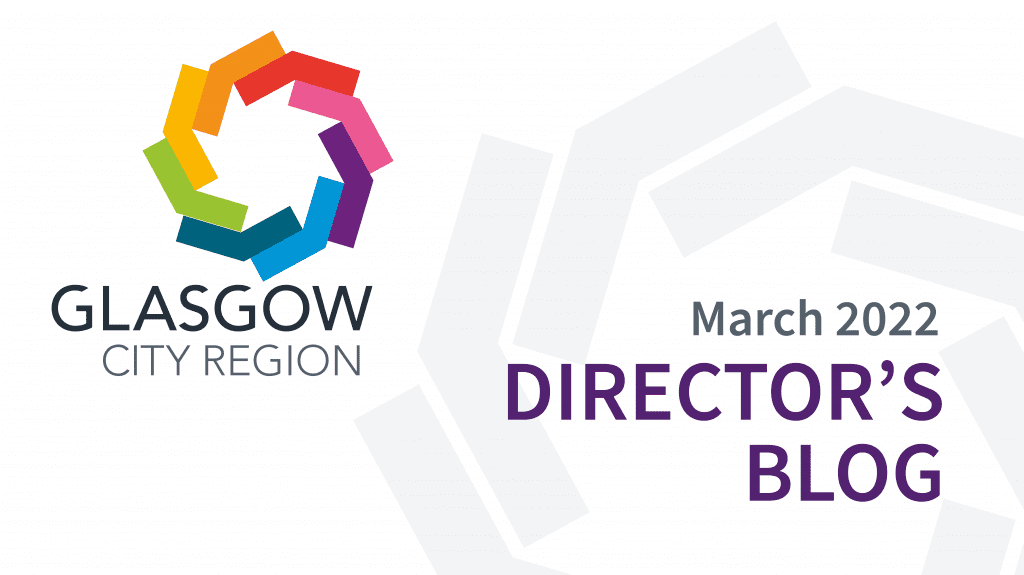March 2022 Director’s Blog
There has been a lot going on over the past four weeks.
At last month’s Cabinet, the eight leaders agreed to a Regional approach to the management of the UK Government Shared Prosperity Fund, a funding stream that will replace the EU Structural funding.
We will now proceed to recruiting a Head of Shared Prosperity Fund post and to setting up a working group of leads from each local authority to develop detailed investment fund proposals for our share of £1.5 billion annual funding, ensuring an appropriate geographical spread of investment based on need and opportunity, and which aligns with our Regional Economic Strategy.
I mentioned last time that the Region has been selected as one of three pilot areas across the UK to share £100 million funding for a new innovation and research accelerator, part of the UK Government’s Levelling Up plans. This too will be taken forward as a Regional project. It will be present a fantastic opportunity for us to build on progress made in recent years, including our three emerging Innovation Districts and to take our innovation economy to the next level, leveraging in substantial private sector investment on the back of public sector funding. In the last five years Glasgow has consistently ranked in the top 20% of the Top 100 most innovative cities in the world and is ranked second in the UK behind London as an emerging tech destination. We recognise that the UK’s major cities have a productivity problem and that Research and Development expenditure outside the Greater South East lags significantly behind. But we have an opportunity to use this funding to catalyse much greater investment, to build on the assets we have and to create high value jobs across the whole Region. To develop the business case for investment, we are assembling an Innovation Partnership, led by the private sector, and including our universities, research institutions and government. This will meet for the first time this month.
Together, the Innovation Accelerator and the Shared Prosperity Fund projects will be worth tens of millions of pounds of investment each year for the Region. We are well placed to take on this role, thanks to our existing partnership structures and success in managing the City Deal. Taking these pre-emptive steps before the formal release of the funding will put us in a good position to develop early bids for funding that meet the required criteria and maximise investment.
A prospectus is anticipated later this month for the Green Freeport model for Scotland. Working with partners from the private sector, the Region will then develop and submit a formal bid in early summer.
Our City Deal continues to support local businesses and people. Last month we issued our latest City Deal contract pipeline showcasing over £290 million worth of contract opportunities coming up in the next five years. Since the City Deal launched in 2014, Regional companies have won contracts to the value of over £118 million – that is 60% of the total number of City Deal contracts. In the current climate, it is vital more than ever to provide local companies with all the information we can to support them to bid for contracts.
Community Benefits clauses built into our City Deal contracts have also supported hundreds of employment, skills and training opportunities for local residents and young people. To date suppliers have committed to more than 70 apprenticeship and 170 new entrant positions. More than 300 work experience placements or workplace visits have taken place, and over 150 young people have been supported to gain vocational training qualifications. It is great to see these positive outcomes and you can hear from some of these young people directly on our YouTube channel.
Last month we hosted our first Strategic Group meeting for the Economies for Healthier Lives Project. One of the project’s aims is to improve partnership working between economic development and public health practitioners. So, it was fantastic to welcome and get the support of key people from a range of different organisations across economic development, public health and the third sector – as well as from key anchor institutions which have significant capital programmes. This group will be vital in providing guidance and in promoting our new project, as it develops and once the toolkit is up and running.
The Intelligence Hub has issued our latest Economic Briefing. This includes an analysis of the Region’s labour market, with the emerging picture fairly positive and unemployment rates across Scotland recovering quickly. Evidence also suggests that young people, who were disproportionately likely to lose their jobs at the start of the pandemic, have seen their employment prospects improving from spring 2021. However, a number of areas for concern remain. Employment growth in the last quarter of 2021 appears to have stalled and economic inactivity is rising. The recent rise in economic inactivity is increasingly being driven by higher worklessness due to ill-health and early retirement. All of this is leading to a smaller pool of labour, which is challenging certain industries. However, this may also present opportunities to support people to get back into the labour market.
This type of valuable intelligence will continue to support policy development for the Region, particularly for our Regional Economic Strategy action plan which will come through in the next few months.
A final point – the Region has joined LinkedIn, so please follow and support our new profile.
View all of our Director’s Blogs.
